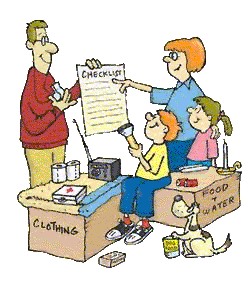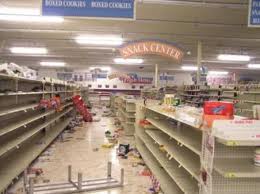 As a family that tries to prepare, as best we can, for the inevitable hard times on the way, we see it as a part of our ‘mission’ to educate other families on the basics of prepping. When we do talk about this topic to others, however, inevitably we are met with resistance. It’s not so much that people, once given some basic facts, don’t see what’s coming. After all, the giant gaping cliff over which we’re headed is pretty obvious even to the ostriches among us. In fact, once they see it, it’s often so overwhelming that most people, understandably, feel powerless to do anything at all. Believe me, we’ve been there. There are times when I think we’re STILL there!
As a family that tries to prepare, as best we can, for the inevitable hard times on the way, we see it as a part of our ‘mission’ to educate other families on the basics of prepping. When we do talk about this topic to others, however, inevitably we are met with resistance. It’s not so much that people, once given some basic facts, don’t see what’s coming. After all, the giant gaping cliff over which we’re headed is pretty obvious even to the ostriches among us. In fact, once they see it, it’s often so overwhelming that most people, understandably, feel powerless to do anything at all. Believe me, we’ve been there. There are times when I think we’re STILL there!
After all, these days EVERYONE is plugged into the ‘grid,’ right? Everyone is dependent on this system that could literally collapse any time, at any speed, and for a multitude of reasons. And even if the system doesn’t collapse entirely, most experts agree that the arrival of serious inflation is just a matter of time. Most families that live paycheck to paycheck can barely afford groceries every week, much less solar panels, water filtration, and 10 years’ worth of freeze-dried food. So what’s the average middle-class or low-income family to do? While we understand that the temptation is certainly there to stick our heads right back in the sand, there ARE ways to accomplish some basic preparations without selling the kids or taking out a second mortgage.
Here are some easy things EVERYONE who is remotely aware of the current economic crisis should do, immediately, regardless of income, location, or situation.
1.) One item at a time, one trip at a time, slowly build your preps at YOUR pace. Regarding long shelf-life items (canned goods, etc.) buy what you normally buy, plus one, or two… Most people can’t afford to double or triple their grocery budget in one month or even one shopping trip, but you’d be amazed at how fast things pile up when you just make it a point to buy something extra EVERY shopping trip. Further, if something is on sale buy as many as you can afford, especially if the expiration date is a long way off. This will save money by not only creating the ‘opportunity to buy’ that you just took, but also the opportunity NOT to buy the next time you go to the store and the item is not on sale.
2.) Eat what you store and store what you eat. While it might give you some peace of mind to have 5 years’ worth of MREs or 20 buckets of pinto beans in the basement, if you and your family are ever faced with a situation where you needed to rely on your stores for any extended period of time, chances are you’ll get tired of them pretty fast. If tomato based foods are a regular staple of your family’s diet, by all means stock lots of canned tomatoes, tomato paste, and tomato sauce. If you DO like pinto beans and eat them regularly, pinto beans should be a significant part of your preps. Store a VARIETY of things that you and your family normally eat.
3.) Organize and rotate your stores. First in, first out! Store like with like in a methodical, organized way. Don’t use something until you KNOW that it’s the oldest of that particular item that you have. It’s a frustrating feeling to use a can of tomatoes that expires in 2015 only to find a can a day later that expires next month. (That said, just because an item ‘expires,’ doesn’t mean you can’t use it. Those are guidelines, but often things will last far longer than their ‘expiration’ dates – except things like dairy, of course – if something doesn’t pass the smell test, toss it out!)
4.) Learn to cook from scratch. This is not only healthier for you and your family, but it allows you to simplify your food preps and use basic, long-term storable staples to make a variety of things. For example, learning to grind wheat and cook with whole-wheat flour allows you to make buckets of wheat a part of your preps – wheat, properly stored, can last for decades. Things like powdered milk, baking powder, spices, honey, etc. have long shelf lives as well. Buy them, store them, and learn to combine them into a cornucopia of amazing, tasty dishes that you and your family will love to eat over and over again. You’ll eat better and save money even if times never get hard!
5.) Expand your horizons. Start with having one month’s worth of food. Allow yourself to feel good about that (hey, it’s better than most people have!), then expand that to two months, then three, six, and even more. Think of other things. In an emergency hardship situation what will you do for water, for power, for heat, etc.? Everyone will be at various stages along that road (we aren’t even CLOSE to where we’d like to be!), but be thinking, be working on SOMETHING.
Forget what your broker will tell you. Prepping is literally one of the best investments in today’s world. Each time we visit the grocery store it seems like food prices are higher than they were the last time. It’s certainly a great feeling to not be as strapped to the roller coaster ride of inflation. For this and a variety of reasons, prepping is not only the proper thing to do IF hard times indeed come to our land – it is a good move even if life stays exactly the same as it always has! Taking these steps will make you and your family’s life better, right now, and will give you a peace of mind that is priceless.
“There is treasure to be desired and oil in the dwelling of the wise; but a foolish man spendeth it up.” Proverbs 21:20
If you enjoy our blog, please consider helping us grow our Facebook Page by clicking ‘like’ in the box to the right of this post!









I have about a 9 month food supply, bought in mostly $5 – $10 extra per week. The things I use on a regular basis, I only have to buy now when I find a good sale! It has dropped my grocery bill by a lot.